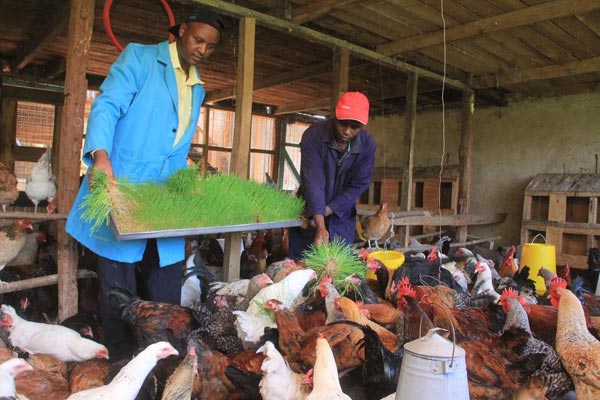Some 26km from Nyeri Town in Giakanja Village, Mukurweini Sub-County, there is the White Den Farm.
The farm hosts over 500 mature Kuroiler chickens and 160 rabbits of New Zealand White, California White, Angora, Chinchilla, Ear lopes and the Dutch breed that owner George Gitahi describes as his lifeline.
The ingredients comprise maize germ, whole maize, soya beans, canola and sunflower seeds and fish and bone meal, which he mixes with coccodiostat, a drug used to prevent and treat chicken intestinal parasites.
“Making my own feeds has enabled me to earn a good profit from this business. It has cut my cost of production by between 30 to 40 per cent. I only buy a bag of the feeds in raw form and mix them at home,” says Gitahi, an electrical engineer at Tata Chemicals in Magadi, noting that his 500 chickens consume up to 60kg a day.
With a 30kg bag of commercial feeds going for Sh2,300, the farmer says he had no option but to make feeds.
But that’s not all. He has installed a hydroponics system where he grows wheat that he feeds his chickens and rabbits, lowering his costs further.
To grow the feeds using the hydroponic system, he sterilises the seeds, cleans them in water and, thereafter, puts them in the trays. The grains sprout after five to seven days and they are ready as feeds.
He mainly feeds his rabbits hay and vegetables that he grows on his farm, besides commercial pellets and the hydroponics wheat.
For mature chickens, he feeds them on the mash he makes from maize germ, whole maize, soya beans, canola, sunflower and coccodiostat, among others, in the morning and evening.
The chickens are also offered hydroponics wheat once a day.
Chicks, on the other hand, are fed on commercial mash for seven weeks before they are weaned on the homemade feeds. “The hay and vegetables must be dried before being fed to rabbits to reduce chances of them contracting bloat and mucoid enteropathy,” says Gitahi.
He uses chicken manure, rabbit droppings and urine to grow tree tomato crops that occupy part of his half-acre farm.
A good rabbit pen should be made to be self-cleaning such that the droppings and the urine do not stay in the hatch, to curb diseases, he advises.
“But having a good hatch does not mean a farmer compromises on hygiene. I disinfect and sterilise the rabbit and the poultry pens using bleaching solutions.”
Doris Wambui, an agricultural officer at the Wambugu Farm Agricultural Training Centre in Nyeri, says pens should be sterilised after every two weeks, especially if the floor is cemented, besides the normal cleaning.
“Pens with laying chicken should be sterilised more often,” she advises, adding that the bleaching solutions should be used to clean all poultry and rabbit feeding and water troughs as well as one should spray the roofs of the structures to kill parasites.
He vaccinates his poultry against Gumboro, Newcastle, fowl pox and fowl typhoid. The chickens are also dewormed regularly.
On the other hand, rabbits are vaccinated after every two weeks against mucoid enteropathy and bloat diseases.
The diseases are caused by poor hygiene in rabbit structures and by giving them succulent foliage. “I vaccinate because I cannot be 100 per cent sure of hygiene in the pens. Vaccinating the rabbits prevents the diseases.”
Gitahi went into poultry and rabbit farming in 2011, investing into the project a Sh300,000 loan he took from a dairy cooperative society in Nyeri. He had been practising dairy farming for about two years, keeping six Friesian cows.
However, due to challenges in getting feeds, his farm was small and the cost of milk was plummeting. That is when he decided to switch to chickens and rabbits after selling the cows in 2011, two years after venturing into the business.
He sells eggs in Nyeri and Nairobi at Sh20 while day-old chicks that he hatches sell for Sh120, month-olds for Sh250 and three-month-olds for Sh450.
On the other hand, he sells the rabbits to Rabbit Republic at four months, when they weigh between 3.5kg and 4kg, at Sh400 per kilo.










George Gitahi(White den farm) contacts please